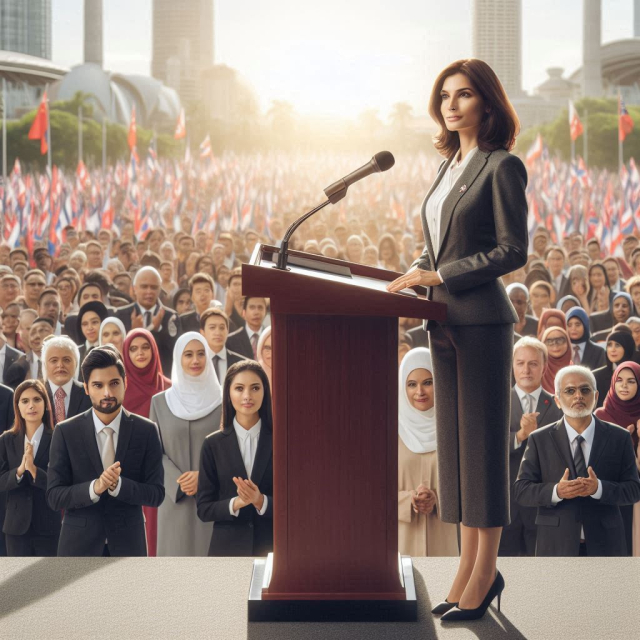The position of president is one of the most important and significant roles within the political structure of a country. Since the creation of the first presidential office in the United States in 1789, the figure of the president has been central to global governance and politics. This article will explore the history of the presidency, the roles and responsibilities of the president, and the relevance of this role in the modern world.
History of the Presidency.
The idea of a democratically elected head of state is relatively new in human history. Before the 18th century, most nations were governed by monarchies, where power was inherited and not granted through popular vote. The American Revolution (1775-1783) and the subsequent creation of the United States Constitution in 1787 ushered in a new era in which the president would be the elected leader of the country.
United States: The First Presidential Model.
George Washington became the first president of the United States in 1789, establishing many of the precedents and standards that remain in place today. The United States Constitution defined the role of the president as the head of the executive branch, responsible for executing the laws, commanding the armed forces, and representing the country in international affairs.
Expansion of the Presidential Model.
The success of the American presidential model inspired other countries to adopt similar systems. In Latin America, most countries that gained independence in the 19th century adopted republican systems with presidents as heads of state. In Europe, some countries also adopted the presidential or semi-presidential model after the First and Second World Wars.
Functions and Responsibilities of the President.
The president of a country has a wide range of responsibilities and powers that vary depending on the constitution and laws of each nation. However, there are several common functions that most presidents share.
Head of the Executive Branch.
The president is the leader of the executive branch of the government, meaning he is responsible for executing and enforcing laws passed by the legislature. This includes the supervision of different government departments and agencies, as well as the implementation of public policies.
Commander in Chief of the Armed Forces.
One of the president's most important responsibilities is to act as commander in chief of the armed forces. This means that the president has the power to direct military operations and make crucial decisions in times of war and peace. However, in many countries, this power is limited by the need to obtain legislative approval to declare war or carry out certain military actions.
Foreign policy.
The president also plays a crucial role in a country's foreign policy. This includes negotiating international treaties and agreements, representing the country at global meetings and summits, and formulating policies that affect relations with other countries.
Legislation.
Although the president is not a member of the legislative branch, he has significant influence on the legislative process. In many countries, the president has the power to veto laws, propose legislation, and call special sessions of the legislature. In addition, the president usually plays an active role in formulating the national budget.
Symbol of National Unity.
The president often acts as a symbol of unity and stability for the nation. In times of crisis, citizens look to the president for leadership and comfort. This symbolic function is crucial to maintaining the morale and cohesion of the country.
The Presidency in the Modern World.
In the modern world, the figure of the president remains of vital importance, although he faces constant challenges and changes.
Modern Challenges.
Today's presidents must confront a series of complex challenges including climate change, terrorism, economic globalization, pandemics and geopolitical tensions. These issues require a coordinated and effective response, making the president's role more crucial than ever.
Evolution of Democracy.
In recent decades, we have seen an evolution in democracies around the world. In some countries, presidents have increased their power, while in others movements have emerged to limit presidential powers and strengthen democratic institutions. The question of the balance of power between the president and other branches of government continues to be a topic of debate and evolution.
Impact of Technology.
Technology has changed the way presidents communicate with the public and make decisions. Social media, in particular, has allowed presidents to connect directly with citizens, bypassing traditional media channels. This has transformed the dynamics of presidential politics and communication.
Examples of Influential Presidents.
Throughout history, there have been many presidents who have left an indelible mark on their countries and the world.
Franklin D. Roosevelt (United States).
Franklin D. Roosevelt, president of the United States from 1933 to 1945, led the country through the Great Depression and World War II. His New Deal policies helped revitalize the American economy, and his wartime leadership was crucial to the eventual Allied victory.
Nelson Mandela (South Africa).
Nelson Mandela, president of South Africa from 1994 to 1999, was a key leader in the fight against apartheid. His presidency symbolized reconciliation and the peaceful transition to a multiracial democracy.
Angela Merkel (Germany).
Although technically the Chancellor of Germany, Angela Merkel has acted as the country's de facto leader and an influential figure in European and international politics. His leadership has been crucial in managing the euro crisis, the migration crisis and Europe's response to the COVID-19 pandemic.
The position of president is one of the most important and complex in the political structure of any nation. Since its origin in the 18th century, the figure of the president has evolved and adapted to the changes and challenges of the modern world. Presidents are responsible for leading the executive branch, commanding the armed forces, directing foreign policy, and acting as symbols of national unity. As we face increasingly complex global problems, the role of the president will continue to be vital to the governance and well-being of nations.
